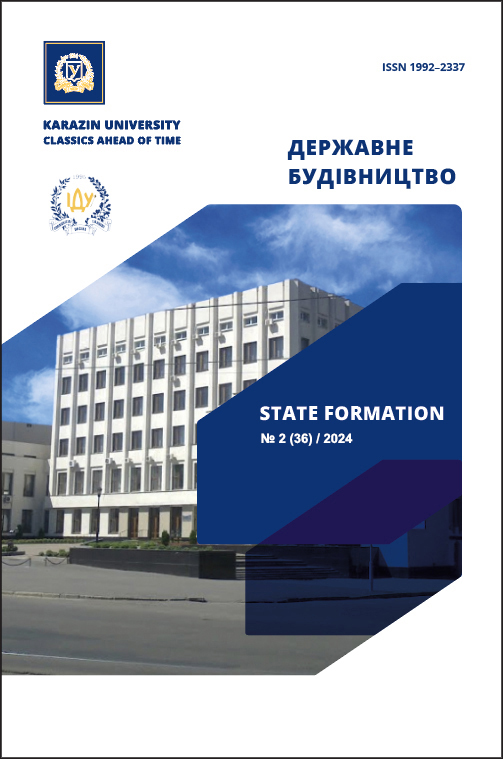Development of digital competencies in public finance as a prerequisite for effective public governance in emergency situations and wartime.
Abstract
The article examines the pressing issue of developing digital competencies in public finance as a key prerequisite for effective public governance during emergency situations and wartime. It emphasizes that the modern world, marked by high turbulence, demands public finance professionals to possess not only traditional expertise but also advanced digital skills, including data analysis, digital literacy, strategic thinking, and the ability to make informed decisions under uncertainty. The impact of emergencies, particularly armed conflicts, on the public finance system is analysed, highlighting the need for modernization of management approaches through the integration of innovative digital technologies. The paper systematizes the theoretical and methodological foundations of developing digital competencies, defining their essence, structure, and significance for enhancing the efficiency of the budgeting process, revenue and expenditure management, financial risk monitoring, and accountability. The distinctive features of implementing digital competencies during wartime are outlined, focusing on the extraordinary strain on public finance systems caused by budget deficits, shifting funding priorities, and the need for rapid responses to humanitarian challenges. Particular attention is paid to methodological approaches for developing digital competencies among public finance professionals. These include building skills in data analysis, strategic thinking, leveraging artificial intelligence technologies, automating processes, and ensuring financial transparency. Practical cases from Ukraine, the United Kingdom, Estonia, and other countries are presented, illustrating successful experiences in the digital transformation of public financial management. The authors propose a combination of formal and informal educational formats, including veteran training, the introduction of Chief Data Officer positions, digital key performance indicators (KPIs) for public officials, and the integration of artificial intelligence into budgeting processes. The study substantiates that the development of digital competencies is not only a tool for enhancing the efficiency of public financial management but also a critical factor in ensuring institutional resilience during emergencies and wartime challenges. The conclusions of the article aim to foster a new governance culture oriented towards innovation, transparency, and adaptability, which will form the foundation for Ukraine’s recovery and development in the post-war period.
Downloads
References
Basiuk, O. (2023). Recommendations for implementing distributed ledger (blockchain) technologies in Ukraine’s public sector based on global experience. Actual Problems of Public Administration, 1(62), 131–154. DOI: https://doi.org/10.26565/1684-8489-2023-1-08 [in Ukrainian].
Basiuk, O.P. (2022). Digital technologies in optimization of the budget process: best international experience and conclusions for Ukraine. Actual Problems of Public Administration, 1(60), 116–131. DOI: https://doi.org/10.26565/1684-8489-2022-1-08 [in Ukrainian].
Blishchuk, K. (2023). Strategies for improving public finance management. Effectiveness of Public Administration, 67, 119–131. DOI: https://doi.org/10.33990/2070-4011.67.2021.240248 [in Ukrainian].
Ministry of Finance of Ukraine (2025). State budget. URL: https://mof.gov.ua/uk/state-budget [in Ukrainian].
Dziundziuk, B.V. (2023). Blockchain technology application in public governance. Investments: Practice and Experience, 10. DOI: https://doi.org/10.32702/2306-6814.2023.10.121. URL: https://nayka.com.ua/index.php/investplan/article/view/1520 [in Ukrainian].
Dunayev, I., & Kud, A. (2020). Constructing Ukraine’s future: From intuitive prophecy to scientific synthesis. Bulletin of Postgraduate Education, 12(41), 142–159. https://doi.org/10.32405/2522-9931/2522-9958-2020-12(41)-142-159. URL: http://umo.edu.ua/images/content/nashi_vydanya/visnyk_PO/12_41_2020/social/Bulletin_12_41_Social_and_behavioral_sciences_Dunayev_Kud.pdf [in Ukrainian].
Karpenko, O. (2022). Digital competencies of public servants in the context of digital transformation of public administration. Public Administration and Local Self-Government, 2, 42–52. DOI: https://doi.org/10.33287/102210 [in Ukrainian].
Novichenko, N.V. (2023). Digital competencies of public servants [Doctoral dissertation, National Mining University]. URL: https://ir.nmu.org.ua/handle/123456789/165574 [in Ukrainian].
Accounting Chamber of Ukraine. (2022). Conclusions on the state of execution of the State Budget of Ukraine during martial law. URL: https://rp.gov.ua/upload-files/Activity/Collegium/2022/10-1_2022/Vysn_10-1_2022_war.pdf [in Ukrainian].
Fedorov, M. (2022). The "Diia" app helped Ukrainians access 15 government services during the war. Ukrinform. URL: https://www.ukrinform.ua/rubric-society/3510365-zastosunok-dia-dopomig-ukraincam-otrimati-15-derzposlug-pid-cas-vijni-fedorov.html [in Ukrainian].
Chala, N., & Kliuchka, D. (2019). Public administration in the digital economy. Economy and the State, 5, 110–114. DOI: https://doi.org/10.32702/2306-6806.2019.5.110 [in Ukrainian].
Barco, G., Villón-Prieto, R., Lau-Hoyos, E., et al. (2024). Corruption in public administration: Evaluation of its impact on government efficiency. Evolutionary Studies in Imaginative Culture, 453–475. DOI: https://doi.org/10.70082/esiculture.vi.1117 URL: http://surl.li/wyrvdw
Bouckaert, G., Galli, D., Kuhlmann, S., Reiter, R., & Van Hecke, S. (2020). European coronationalism? A hot spot governing a pandemic crisis. Public Administration Review, 80(5), 765–773. DOI: https://doi.org/10.1111/puar.13242
Crosby, B., Hart, P., & Torfing, J. (2016). Public value creation through collaborative innovation. Public Management Review, 19, 1–15. DOI: https://doi.org/10.1080/
2016.1192165
Dawson, G.S., & Thomson, R. (2018). The future cybersecurity workforce: Going beyond technical skills for successful cyber performance. Frontiers in Psychology, 9, Article 744. DOI: https://doi.org/10.3389/fpsyg.2018.00744
Dunayev, I., & Kud, A. (2020). Developing digital skills and competencies of Ukrainian specialists as a vital need in the global digital transformation era. Pressing Problems of Public Administration, 1(57), 8–17. DOI: https://doi.org/10.34213/аp.20.01.01
Dunleavy, P., & Margetts, H. (2015). Design principles for essentially digital governance. 111th Annual Meeting of the American Political Science Association, 3–6. URL: https://eprints.lse.ac.uk/64125/
European Court of Auditors. (2021). Special report: The EU’s initial contribution to the public health response to COVID-19. URL: https://www.eca.europa.eu/en/Pages/
DocItem.aspx?did=57722
Mergel, I., Edelmann, N., & Haug, N. (2019). Defining digital transformation: Results from expert interviews. Government Information Quarterly, 36(4), Article 101385. DOI: https://doi.org/10.1016/j.giq.2019.06.002
OECD. (2010). OECD Economic Outlook, Vol. 2010/2. DOI: http://dx.doi.org/10.1787/eco_outlook-v2010-2-en
Pinsent Masons. (2021). UK Budget 2021: £100m investment in HMRC to tackle COVID-19 fraud. URL: https://www.pinsentmasons.com/out-law/news/uk-budget-2021-100m-investment-hmrc-tackle-covid19-fraud
Raudla, R., & Douglas, J. (2020). This time was different: The budgetary responses to the pandemic-induced crisis in Estonia. Journal of Public Budgeting, Accounting & Financial Management, 32(5), 847–854. URL: https://ideas.repec.org/a/eme/jpbafm/jpbafm-07-2020-0094.html
Silva, E., & Marques, R. (2021). Blockchain in the public sector: A systematic literature review. AtoZ novas práticas em informação e conhecimento, 10, Article 11. URL: https://www.researchgate.net/publication/366702196_Blockchain_in_the_public_sector_a_systematic_literature_review
Stiglitz, J.E. (2017). The revolution of information economics: The past and the future. NBER Working Papers, 23780. DOI: https://doi.org/10.3386/w23780
Yang, C., Gu, M., & Albitar, K. (2024). Government in the digital age: Exploring the impact of digital transformation on governmental efficiency. Technological Forecasting and Social Change, 208, Article 123722. DOI: https://doi.org/10.1016/j.techfore.2024.123722

